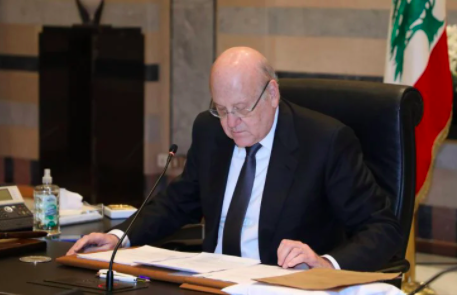
Lebanese Prime Minister Najib Mikati chairs a meeting of his government on March 23. (Credit: Dalati and Nohra)
BEIRUT — Lebanese Prime Minister Najib Mikati expressed optimism on Wednesday for an improvement in relations between Lebanon and the Gulf countries, a day after Saudi Arabia’s Foreign Ministry expressed positivity towards Lebanon, saying “the Gulf [countries] statements indicates that the dark cloud that covered relations [between Lebanon and Gulf countries] will soon disappear.”
Here’s what we know:
Following today’s cabinet session, Mikati also said "What binds Lebanon and its people to its brothers in the Gulf is a common history, the belief in a common destiny.”
The Kuwaiti Foreign Ministry on Tuesday evening welcomed Najib Mikati's statements, in which he renewed his government's commitment to take the necessary measures for Lebanon to restore its ties with the GCC. In a statement, Kuwait said that it seeks to "pursue constructive and practical measures for this purpose, which will contribute to greater security, stability and prosperity for Lebanon and its fraternal people.”
Earlier Tuesday, Saudi Arabia also welcomed "the positive points" in a Monday statement from Mikati, and said it hoped that "it will help Lebanon regain its role and status on the Arab and international levels.”
On Monday, the Prime Minister reaffirmed Lebanon's determination to prohibit its financial and banking system from being used in operations that "could undermine the security of Saudi Arabia and the GCC countries.” He also called for "the cessation of political, military, security and media activities that undermine the sovereignty" of these countries.
Last October, comments by former Information Minister George Kurdahi about Saudi Arabia's role in the war in Yemen soured relations between Beirut and several Gulf Countries.
According to information obtained by L'Orient-Le Jour, a meeting of the Gulf Cooperation Council is scheduled for Sunday and could lead to the return of GCC ambassadors to Beirut, who were recalled in October following rising tensions that resulted from Kurdahi’s comments.